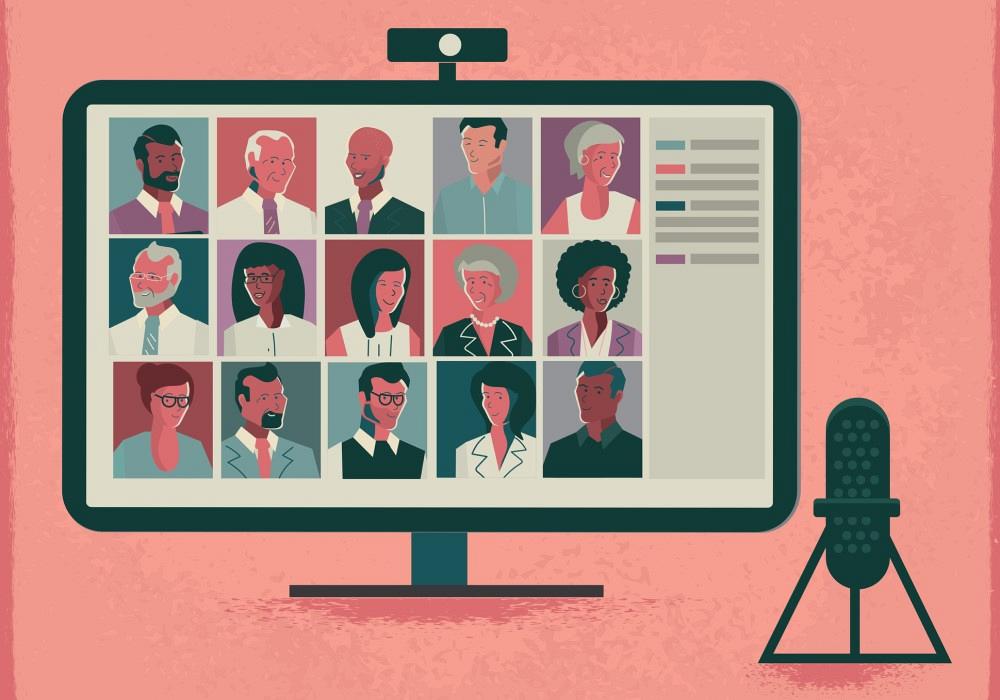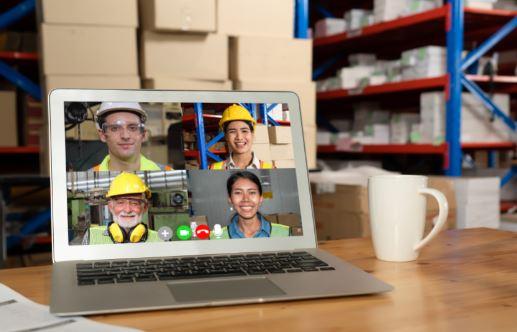Editor-in-Chief
- FMA
- The Fabricator
- FABTECH
- Canadian Metalworking
Categories
- Additive Manufacturing
- Aluminum Welding
- Arc Welding
- Assembly and Joining
- Automation and Robotics
- Bending and Forming
- Consumables
- Cutting and Weld Prep
- Electric Vehicles
- En Español
- Finishing
- Hydroforming
- Laser Cutting
- Laser Welding
- Machining
- Manufacturing Software
- Materials Handling
- Metals/Materials
- Oxyfuel Cutting
- Plasma Cutting
- Power Tools
- Punching and Other Holemaking
- Roll Forming
- Safety
- Sawing
- Shearing
- Shop Management
- Testing and Measuring
- Tube and Pipe Fabrication
- Tube and Pipe Production
- Waterjet Cutting
Industry Directory
Webcasts
Podcasts
FAB 40
Advertise
Subscribe
Account Login
Search
Virtually certain that interactions won’t be the same even after COVID-19
Coronavirus has forced people to ditch face-to-face meetings in favor of digital connections, and that may not be so bad
- By Dan Davis
- November 3, 2020
For more than 25 years, the Advanced Laser Applications Workshop (ALAW) has been held in the Detroit area, giving attendees the chance to learn about the latest laser technologies and how they are being applied in the automotive industry and manufacturing in general. The event is unique in the sense that technology developers are open about their research and advancements, instead of trying to hide them from parties that probably know about them already. These are smart people that love what they do and are excited to see laser technology at work in manufacturing.
This year’s workshop was a bit different, however. It was virtual. The Fabricators & Manufacturers Association (FMA), the parent organization of ALAW, reported that 165 people attended at least one of the keynote addresses, technical sessions, or an equipment demonstration. That total attendance wasn’t as robust as the previous year’s 227 people, but it was similar to other years’ totals. It’s hard to describe the event as anything more than a success.
Is this a one-year occurrence? Hopefully, we won’t need to find out if a coronavirus vaccine becomes available early next year. ALAW 2021 is scheduled to be an in-person event June 2-4 in the Detroit area. But if a vaccine has not yet been developed or it simply isn’t available, FMA has the knowledge that it can make the conference work without the need to rent out space in a hotel and arrange for catering three meals a day. People have evolved so that they are more comfortable interacting through the video camera in their computers.
Families have regular virtual meetups to ensure those over 65 stay safe and sound. Teachers are now in classrooms doing their best not only to instruct students in the desks in front of them, but also those who remain at home because of medical reasons. Even in the metal fabricating industry, manufacturers and job shops are seeing fewer technical service representatives because machine tool companies want to diagnose and fix equipment using remote diagnostics or even internet-enabled glasses. These service techs can tap into the machines to see what may have led up to unexpected downtime and suggest a fix to get it up and running again, all without having to get in a car or plane.
Virtual communication is now firmly cemented as a real option in today’s manufacturing environment. Whereas a shop might have used videoconferencing to impress a client or because a customer in a forward-thinking industry segment, like electronics or office furniture manufacturing, demanded it, most shops are going to have to make it a part of their everyday communications plan. People expect it.
Of course, this makes sense for smaller, more intimate gatherings, but trying to replicate a large tradeshow in a virtual arena is difficult. People come to an event like FABTECH to kick the tires on equipment that they’ve read about; walk the aisles to discover something that they might not have ever seen before; attend a technical seminar; meet old friends; and enjoy being away from the manufacturing facility, a place that sometimes has a 24/7 hold on people.
Since FABTECH 2020 was canceled, several exhibitors have ramped up efforts to offer their own seminars and equipment demonstrations over the web. It’s a noble effort and certainly has attracted attention from interested parties, but it can’t rival an event like FABTECH, which draws more than 40,000 attendees when it is held in Chicago. Again, let’s keep our fingers crossed that Chicago city officials have seen enough improvements to feel that the coronavirus is under control and gives the OK to hold FABTECH Sept. 13-16. For the optimists, event registration opens in January!
For the near term, virtual meetings may be the norm. In a summer survey from Meeting Professionals International, an organization of 15,000 members, 86% of respondents foresaw declining attendance for live events over the next 12 months, while 87% said virtual events would see an increase in participants.
With that in mind, metal fabricators will have the chance to participate in the FMA’s first virtual Annual Meeting, March 3-4. Typically, it’s a great chance to learn from other metal fabricators and network with peers. Now fabricators can do it without getting in a car or plane. There’s no better way to see the value that this event can offer you and your business. Visit https://annualmeeting.fmanet.org/ in the coming months for more information.
subscribe now

The Fabricator is North America's leading magazine for the metal forming and fabricating industry. The magazine delivers the news, technical articles, and case histories that enable fabricators to do their jobs more efficiently. The Fabricator has served the industry since 1970.
start your free subscriptionAbout the Author

Dan Davis
2135 Point Blvd.
Elgin, IL 60123
815-227-8281
Dan Davis is editor-in-chief of The Fabricator, the industry's most widely circulated metal fabricating magazine, and its sister publications, The Tube & Pipe Journal and The Welder. He has been with the publications since April 2002.
Related Companies
- Stay connected from anywhere

Easily access valuable industry resources now with full access to the digital edition of The Fabricator.

Easily access valuable industry resources now with full access to the digital edition of The Welder.

Easily access valuable industry resources now with full access to the digital edition of The Tube and Pipe Journal.
- Podcasting
- Podcast:
- The Fabricator Podcast
- Published:
- 04/16/2024
- Running Time:
- 63:29
In this episode of The Fabricator Podcast, Caleb Chamberlain, co-founder and CEO of OSH Cut, discusses his company’s...
- Industry Events
16th Annual Safety Conference
- April 30 - May 1, 2024
- Elgin,
Pipe and Tube Conference
- May 21 - 22, 2024
- Omaha, NE
World-Class Roll Forming Workshop
- June 5 - 6, 2024
- Louisville, KY
Advanced Laser Application Workshop
- June 25 - 27, 2024
- Novi, MI

































